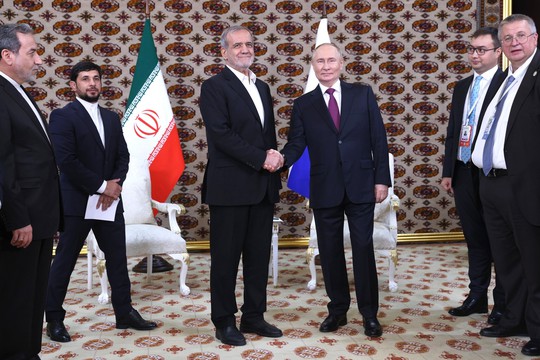President of Iran Masoud Pezeshkian and Russian President Vladimir Putin met at Ashgabat, Turkmenistan, October 11, 2024.
Photo: Kremlin.ru
Israel has apparently shelved its planned attack on Iran. A combination of circumstances can be attributed to this retreat, which rubbishes Israel’s own high-pitched rhetoric that it was raring to go, notes M.K. Bhadrakumar, Indian Ambassador and prominent international observer.
Despite Israel’s brilliant media management, reports have surfaced that the Iranian missile attack on October 1 was a spectacular success. It was a display of Iran’s deterrence capability to crush Israel, if need arises. The failure of the US to intercept Iranian hypersonic missiles carried its own message. Iran claims that 90 percent of its missiles penetrated Israel’s air defence system.
Will Schryver, a technical engineer and security commentator, wrote: “I don’t understand how anyone who has seen the many video clips of the Iranian missile strikes on Israel cannot recognise and acknowledge that it was a stunning demonstration of Iranian capabilities. Iran’s ballistic missiles smashed through US/Israeli air defences and delivered several large-warhead strikes to Israeli military targets.”
Evidently, in the ensuing panic situation in Israel, as the US president Joe Biden put it. “If I were in their [Israeli] shoes, I’d be thinking about other alternatives than striking oil fields,” Biden said in a rare appearance in the White House briefing room a day after Israeli officials were saying that a “significant retaliation” was imminent.
In this pantomime, it is safer to believe Biden, as the honest truth is that without US inputs and practical help, and money — and direct intervention — Israel simply lacks the stamina to take on Iran. Israel’s regional dominance narrows down to executing assassination plots and attacking unarmed civilians.
Interestingly, CIA Director William Burns stepped in to refute the rumours that Iran conducted a nuclear test. Speaking at a security conference on Monday, Burns stated that the US has closely monitored Iran’s nuclear activity for any sign of rushing toward a nuclear bomb.
“We don’t see evidence today that such a decision has been made. We watch it very carefully,” he said. Burns gently erased another alibi to attack Iran.
One critical factor that has compelled Israel / US to defer any attack on Iran is the stern warning by Tehran that any attack on its infrastructure by Israel will be met with an even harsher response. “In responding, we neither hesitate nor rush,” to quote Foreign Minister, Abbas Araghchi, who, by the way, made a trip to Lebanon and Syria over the weekend by way of giving Israel a defiant “message” — as he put it — that “Iran has strongly backed the resistance and will always support it.”
However, what deters the Israelis and causes uneasiness in the American mind is something else — Russia’s lengthening shadows on the West Asian tapestry.
To be sure, the Russian involvement in Iran’s standoff with Israel is potentially a game changer. From the US perspective, it raises the worrisome spectre of a direct confrontation with Russia, which it doesn’t want.
The ‘working meeting’ between Russian President Vladimir Putin and his Iranian counterpart Masoud Pezeshkian took part at Ashgabat, Turkmenistan.
Pezeshkian pointedly suggested to Putin that the signing of their proposed strategic treaty should be speeded up. Putin is known to have approved the draft agreement as far back as September 18. Pezeshkian proposed that the ceremony could take place in Kazan during BRICS summit.
Pezeshkian told Putin that Iran and Russia have good mutual and complementary potentials and can help each other. Pezeshkian stressed that Iran’s ties with Russia are “sincere and strategic.” He added, “Our positions on global matters are much closer to each other than to those of many other countries.”
According to the Kremlin transcript, Putin told Pezeshkian, “Our relationship with Iran is a priority for us, and it is developing very successfully… We are actively cooperating on the international arena, and often share close or even converging assessments of the ongoing developments.”
read more in our Telegram-channel https://t.me/The_International_Affairs

 12:25 18.10.2024 •
12:25 18.10.2024 •























